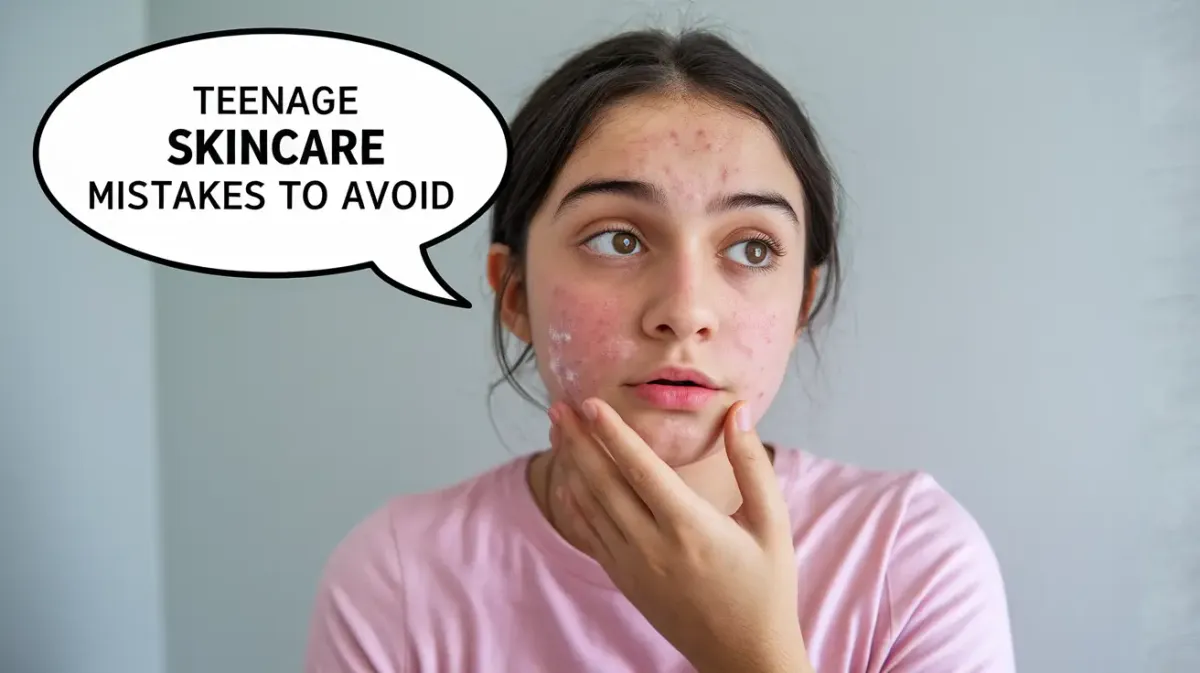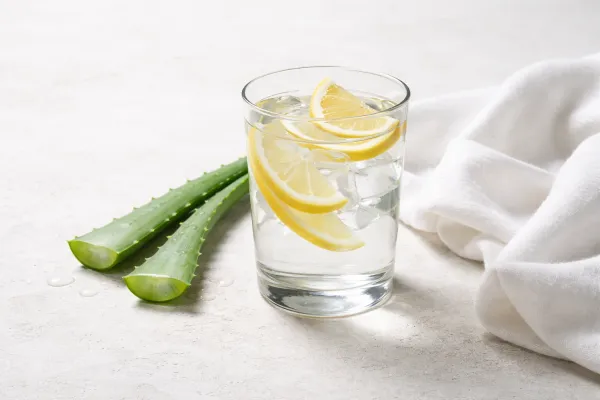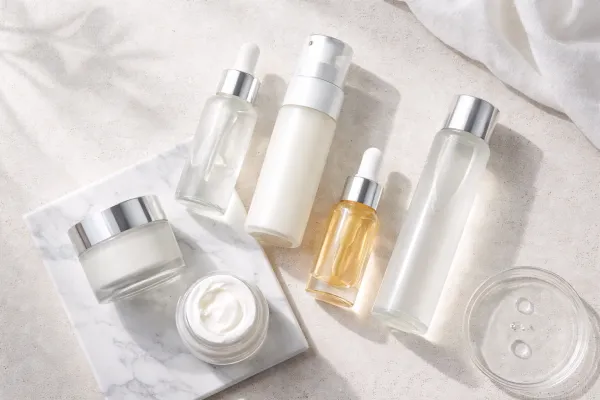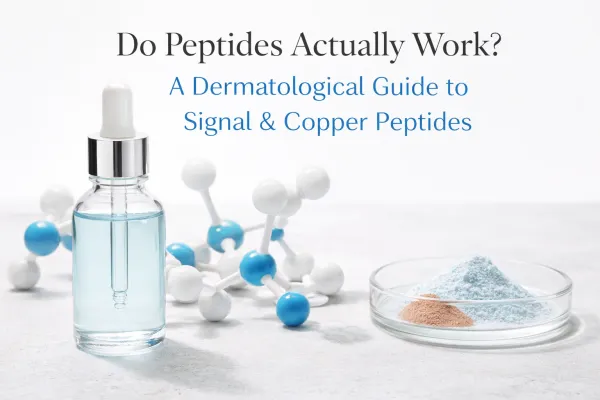Teenage Skincare Mistakes to Avoid
Discover the most common teenage skincare mistakes and how to avoid them. Learn expert tips for a healthy, clear complexion and a simple skincare routine.

Let's face it, being a teenager is a wild ride.
Hormones are doing the cha-cha, and your skin?
Well, it's often the first place to show it. From sudden breakouts to mysterious dry patches, it can feel like your face is playing a cruel joke on you.
But here's the truth: most skin issues during your teens aren't some random act of nature. They're often the result of common teenage skincare mistakes.
The good news is, these mistakes are totally fixable, and I'm here to guide you through it. I've seen countless teens struggle with their skin, and trust me, a few tweaks to your routine can make a world of difference.
So, let's dive in and get your skin glowing!
Key Takeaways: Teenage Skincare Mistakes to Avoid
- Harsh Products Are a No-Go: Avoid strong cleansers and scrubs that can damage your skin barrier.
- Moisturizer is Your Friend: Even oily skin needs hydration to prevent excess oil production.
- Sunscreen is Non-Negotiable: Protect your skin daily from sun damage, even on cloudy days.
- Don't Over-Exfoliate: Limit exfoliation to 2-3 times a week to prevent irritation.
- Never Sleep with Makeup On: Always remove makeup to avoid clogged pores and breakouts.
- Gentle Cleansing is Key: Wash your face twice daily with a gentle, pH-balanced cleanser.
- Choose the Right Products: Opt for lightweight, oil-free, and non-comedogenic moisturizers.
- Be Wary of Trends: Don't blindly follow social media trends; stick to a simple, consistent routine.
- Avoid Certain Ingredients: Steer clear of niacinamide, vitamin C, AHAs, and peptides before age 18.
- Consistency is Crucial: A simple, consistent routine is more effective than sporadic, intense treatments.
The Peril of Harsh Products: Why Gentle is the Way to Go
One of the biggest skincare blunders I see teens making is reaching for the harshest products they can find. It's like thinking you can fix a broken bone by hitting it harder – it just doesn't work!
When you use strong cleansers, scrubs, or anything that makes your skin feel tight and squeaky clean, you're actually stripping away the natural oils that protect your skin. This is called damaging the skin barrier, and it's a big deal. A damaged skin barrier can lead to all sorts of problems, like redness, irritation, and even more breakouts.
Your skin is smart, and when it's stripped of its oils, it goes into overdrive, producing even more oil to compensate. It's a vicious cycle. Instead, opt for gentle, pH-balanced cleansers. Think of it like washing your clothes – you wouldn't use bleach on a delicate silk shirt, would you?
The same logic applies to your face. Look for cleansers that are designed for sensitive skin, and avoid anything with harsh sulfates or strong fragrances. This is a foundational step, and getting it right will make a huge difference in the long run. Remember, the goal is to cleanse your skin, not to punish it.
Understanding the signs of a damaged skin barrier is crucial for making informed skincare choices.
- Avoid cleansers with sulfates (like SLS and SLES).
- Choose pH-balanced cleansers (around 5.5).
- Look for gentle ingredients like glycerin and ceramides.
- Avoid physical scrubs with large, abrasive particles.
- Pat your skin dry instead of rubbing it.
Moisturizer: The Secret Weapon for All Skin Types
I can't tell you how many times I've heard, "But I have oily skin, so I don't need moisturizer!" This is a myth that needs to be busted, and busted hard. Think of your skin like a plant – it needs water to thrive, no matter how much sun it gets. Skipping moisturizer is like telling your skin to fend for itself in the desert.
When you don't moisturize, your skin gets dehydrated, and guess what? It overcompensates by producing even more oil. This leads to clogged pores, breakouts, and a shiny complexion that no one wants. The key is to choose the right moisturizer. Look for lightweight, oil-free, and non-comedogenic options. Non-comedogenic means that the product won't clog your pores.
These types of moisturizers will provide the hydration your skin needs without making it feel greasy or heavy. It's all about finding the right balance. And yes, even if your skin is oily, you absolutely need a moisturizer. It's not about adding oil, it's about adding hydration. I've seen firsthand how this simple step can transform a teen's skin from a greasy mess to a healthy, balanced glow. It's a game-changer, trust me.
For those with oily skin, finding the right moisturizer is key to maintaining a healthy balance.
| Skin Type | Recommended Moisturizer | Ingredients to Look For |
|---|---|---|
| Oily | Lightweight, oil-free, gel-based | Hyaluronic acid, glycerin, ceramides |
| Dry | Rich, creamy, emollient | Shea butter, squalane, ceramides |
| Combination | Lightweight lotion or gel | Hyaluronic acid, ceramides, antioxidants |
Sunscreen: Your Daily Shield Against Damage
If there's one thing I could scream from the rooftops, it's this: wear sunscreen, every single day! I know, I know, it's not the most exciting part of your routine, but it's absolutely crucial. Sun damage is cumulative, meaning it builds up over time.
Think of it like a sunburn – you might not see the immediate damage, but it's there, causing long-term problems like dark spots, premature aging, and even skin cancer. And it's not just about sunny days at the beach. Even on cloudy days, those harmful UV rays are still reaching your skin. So, make sunscreen a non-negotiable part of your daily routine.
Choose a broad-spectrum sunscreen with an SPF of 30 or higher. Broad-spectrum means it protects against both UVA and UVB rays. Apply it liberally to all exposed areas of your skin, and reapply every two hours, especially if you're sweating or swimming.
I've seen too many teens develop sun damage that could have easily been prevented with a simple sunscreen application. It's the best anti-aging product you'll ever use, and it's never too early to start. It’s a simple step with massive long-term benefits.
Explore the best sunscreens for teens to find the perfect fit for your skin.
- Use a broad-spectrum sunscreen with SPF 30 or higher.
- Apply sunscreen 15-20 minutes before sun exposure.
- Reapply every two hours, or after swimming or sweating.
- Don't forget areas like your ears, neck, and the back of your hands.
- Choose a sunscreen that's comfortable for daily use.
The Over-Exfoliation Trap: Less is More

Exfoliation is like a double-edged sword – when done right, it can leave your skin feeling smooth and radiant, but when overdone, it can cause serious damage. Many teens get caught in the trap of over-exfoliating, thinking that more is better.
They use harsh scrubs daily, hoping to get rid of every last imperfection. But this is a huge mistake. Over-exfoliation can cause redness, dryness, irritation, and even increased breakouts. It's like sanding your skin down too much – you're removing the protective layers and leaving it vulnerable.
The key is to exfoliate gently and sparingly. Limit exfoliation to 2-3 times a week, and choose chemical exfoliants over harsh physical scrubs. Chemical exfoliants, like AHAs (alpha-hydroxy acids) and BHAs (beta-hydroxy acids), gently dissolve dead skin cells without the need for abrasive particles. They're much kinder to your skin and can be incredibly effective.
Remember, the goal is to remove dead skin cells, not to scrub your skin raw. I've seen teens transform their skin by simply dialing back on the exfoliation, and it's a lesson that's worth learning early on.
Learn more about essential exfoliation tips, especially if you have darker skin.
| Type of Exfoliant | Frequency | Benefits | Cautions |
|---|---|---|---|
| Physical Scrubs | 1-2 times a week | Immediate smoothness | Can be harsh, cause micro-tears |
| Chemical Exfoliants (AHAs/BHAs) | 2-3 times a week | Gentle, effective, can target specific concerns | Start slow, can cause sensitivity |
| Enzyme Exfoliants | 1-2 times a week | Very gentle, good for sensitive skin | May not be as effective for deep exfoliation |
Sleeping with Makeup On: A Recipe for Disaster
I get it, you're tired, it's late, and removing your makeup is the last thing you want to do. But trust me on this one, sleeping with makeup on is a major no-no. It's like inviting all sorts of skin problems to come and party on your face. When you sleep with makeup on, it clogs your pores, preventing your skin from breathing and renewing itself.
This leads to breakouts, irritation, and dullness. Think of it like sleeping in your clothes after a workout – you wouldn't do that, would you? Your skin needs to breathe and recover overnight, and makeup prevents that. The solution is simple: always remove your makeup before bed. Use makeup wipes or micellar water for a quick and easy removal.
Then, follow up with a gentle cleanser to ensure all traces of makeup are gone. It's a small step that can make a huge difference in the health and clarity of your skin. I've seen countless teens struggle with persistent breakouts, and often, the culprit is simply sleeping with makeup on. Don't let this be you – make makeup removal a non-negotiable part of your bedtime routine.
For a quick and easy makeup removal, consider using top cleansers for teenage skin.
- Use makeup wipes or micellar water for a quick removal.
- Follow up with a gentle cleanser.
- Avoid harsh cleansers that can strip your skin.
- Use a soft cloth or cotton pad to remove makeup.
- Be gentle around the eye area.
Cleansing Frequency: Finding the Right Balance
When it comes to cleansing, it's all about finding the right balance. Washing your face too often can strip your skin of its natural oils, leading to dryness and irritation. On the other hand, not washing enough can lead to clogged pores and breakouts.
The sweet spot is to wash your face twice daily – once in the morning and once in the evening. In the morning, cleansing helps to remove any sweat and oil that accumulated overnight. In the evening, it's crucial to remove makeup, sunscreen, and any dirt or pollutants that your skin has come into contact with during the day.
Choose a gentle, pH-balanced cleanser that's suitable for your skin type. Avoid harsh cleansers that can strip your skin of its natural oils. And remember, it's not about scrubbing your face raw, it's about gently cleansing it. I've seen teens go from over-cleansing to under-cleansing, and both can lead to skin issues. The key is to find that happy medium and stick to it. Consistency is key when it comes to skincare, and cleansing is no exception.
Explore best cleansers for acne-prone skin if you're struggling with breakouts.
- Wash your face twice daily – morning and evening.
- Use a gentle, pH-balanced cleanser.
- Avoid hot water, which can dry out your skin.
- Pat your skin dry instead of rubbing it.
- Don't over-cleanse, as this can lead to irritation.
Choosing the Right Moisturizer: Lightweight and Non-Comedogenic
We've already established that moisturizer is essential, but it's not just about slapping on any old cream. The type of moisturizer you choose can make a huge difference in the health and appearance of your skin. For teens, especially those with oily or acne-prone skin, lightweight, oil-free, and non-comedogenic moisturizers are the way to go. These types of moisturizers provide the hydration your skin needs without clogging your pores or making your skin feel greasy.
Look for ingredients like hyaluronic acid, glycerin, and ceramides, which are all excellent for hydrating the skin without adding excess oil. Avoid heavy creams or moisturizers that contain pore-clogging ingredients like mineral oil or lanolin. It's all about finding the right balance between hydration and lightness. I've seen teens make the mistake of using their mom's heavy anti-aging cream, which is often too rich for young skin.
Remember, your skin has different needs than mature skin, so choose products that are specifically designed for your age group. It's a simple change that can make a big difference in the overall health of your skin.
Learn more about choosing moisturizers for melanin-rich skin if you have darker skin tones.
| Feature | Lightweight Moisturizer | Heavy Cream |
|---|---|---|
| Texture | Light, gel-like or lotion | Thick, creamy |
| Pore-clogging potential | Low (non-comedogenic) | High (can clog pores) |
| Best for | Oily, acne-prone, combination skin | Dry, mature skin |
| Ingredients | Hyaluronic acid, glycerin, ceramides | Shea butter, mineral oil, lanolin |
The Influence of Social Media: Proceed with Caution
Social media can be a great source of information and inspiration, but it can also be a breeding ground for misinformation, especially when it comes to skincare. I've seen countless teens jump on the latest skincare trends they see on TikTok or Instagram without doing their research.
The problem is, not everything you see online is true, and what works for one person might not work for you. Many of these trends are promoted by influencers who aren't experts in skincare, and they might not even be using the products they're promoting. It's important to be critical and do your own research before trying any new skincare trend. Stick to a simple, consistent routine that's based on the advice of dermatologists and skincare professionals.
Don't fall for the hype of miracle products or quick fixes. Skincare is a journey, not a race, and it takes time and patience to see results. I've seen teens damage their skin by following unverified advice, and it's a lesson that's worth learning early on. Be smart, be informed, and don't let social media dictate your skincare routine.
For more expert advice, check out how to do skincare for beginners.
- Be skeptical of skincare trends on social media.
- Do your research before trying new products.
- Consult with a dermatologist for personalized advice.
- Stick to a simple, consistent routine.
- Don't fall for the hype of miracle products.
Expert Advice: Ingredients to Avoid Before 18
As a skincare expert, I've seen firsthand the effects of using the wrong products on young skin. It's crucial to understand that teenage skin is different from adult skin, and it requires a different approach.
One of the biggest mistakes I see is teens using products that are too strong or too active for their skin. According to Dr. Debra Jaliman, a renowned dermatologist, it's best to avoid products containing niacinamide, vitamin C, AHAs, and peptides before the age of 18.
These ingredients can be too irritating for young skin and can lead to redness, dryness, and breakouts. While these ingredients can be beneficial for mature skin, they're often too harsh for the delicate skin of teenagers. Instead, focus on gentle, hydrating ingredients that support the skin barrier. It's all about choosing products that are appropriate for your age and skin type. I've seen teens unknowingly damage their skin by using products that are simply too strong.
Remember, less is often more when it comes to skincare, especially during your teenage years. It's better to start with a simple, gentle routine and gradually introduce new products as needed.
Learn more about skincare products to avoid for darker skin, as some ingredients can cause hyperpigmentation.
- Avoid products containing niacinamide before age 18.
- Steer clear of vitamin C serums and creams.
- Limit the use of AHAs and BHAs to 2-3 times a week.
- Avoid peptides in your skincare routine.
- Focus on gentle, hydrating ingredients.
The Power of Consistency: The Key to Clear Skin
Finally, and perhaps most importantly, remember that consistency is key when it comes to skincare. It's not about using a bunch of fancy products or trying the latest trends. It's about finding a simple, effective routine that works for your skin and sticking to it. Skincare is a marathon, not a sprint, and it takes time and patience to see results.
Don't get discouraged if you don't see changes overnight. Keep up with your routine, and over time, you'll start to see improvements in your skin's health and clarity. I've seen teens try every product under the sun, only to give up when they don't see immediate results. The truth is, there's no magic bullet for perfect skin. It's about being consistent with your routine, being patient, and listening to your skin.
And remember, everyone's skin is different, so what works for one person might not work for you. It's about finding what works for you and sticking to it. This is the most important piece of advice I can give you, and it's the foundation of any successful skincare routine.
For a comprehensive guide, check out the ultimate AM and PM skincare routine.
- Create a simple, consistent skincare routine.
- Stick to your routine, even when you don't see immediate results.
- Be patient and give your skin time to adjust.
- Listen to your skin and adjust your routine as needed.
- Don't give up – consistency is key!
Conclusion
Navigating the world of teenage skincare can feel overwhelming, but it doesn't have to be. By avoiding these common teenage skincare mistakes and sticking to a simple, consistent routine, you can achieve healthy, glowing skin.
Remember, gentle is always better, sunscreen is non-negotiable, and consistency is key. Don't fall for the hype of social media trends, and always do your research before trying new products.
Listen to your skin, and don't be afraid to seek advice from a dermatologist if you're struggling. With a little knowledge and patience, you can overcome these challenges and achieve the clear, radiant skin you deserve. It's a journey, not a destination, so be kind to yourself and enjoy the process. And remember, I'm here to guide you every step of the way. You got this!
Frequently Asked Questions
What are the most common skincare mistakes teenagers make?
Teenagers often make mistakes like using harsh products, skipping moisturizer, neglecting sunscreen, over-exfoliating, and sleeping with makeup on. These can lead to irritation, breakouts, and long-term skin damage. Because many beauty products contain preservatives, chemicals or fragrances that could irritate or dry out your skin, it's a good idea to introduce new products one at a time. Introducing too many new products at once can overwhelm your skin and cause further irritation. Avoid harsh cleansers and over-exfoliation. Consistency is key when it comes to seeing results from acne treatments.
Is it really necessary for teenagers to use sunscreen every day?
Absolutely! Sunscreen is crucial for protecting your skin from harmful UV rays, even on cloudy days. It prevents long-term damage like dark spots, premature aging, and skin cancer. Make it a daily habit. You should apply sunscreen every day on skin not covered by clothing if you will be outside. The sun emits harmful UV rays year-round. Even on cloudy days, up to 80% of the sun's harmful UV rays can penetrate the clouds. Dermatologists recommend using a sunscreen with an SPF of at least 30, which blocks 97% of the sun's UVB rays. Higher-number SPFs block slightly more of the sun's UVB rays, but no sunscreen can block 100% of the sun's UVB rays.
I have oily skin, do I still need to use moisturizer?
Yes, even oily skin needs moisturizer. Skipping moisturizer can lead to dehydration, causing your skin to produce even more oil. Choose a lightweight, oil-free, non-comedogenic moisturizer to keep your skin balanced. Moisturizer works by trapping water in your skin, which can help reduce the appearance of fine lines and make your skin look brighter and younger. For the best results, apply moisturizer to your face and body immediately after bathing, showering or shaving while the skin is still damp. The skin care products you choose will depend on your skin type. If you have acne-prone skin, look for cleansers and moisturizers that say "oil free" or "non-comedogenic," as these won't clog your pores.
How often should teenagers exfoliate their skin?
Limit exfoliation to 2-3 times a week. Over-exfoliating can cause redness, dryness, and increased breakouts. Opt for gentle chemical exfoliants rather than harsh physical scrubs. It depends on your skin type and the type of exfoliant you're using. Generally, 1-3 times per week is a good starting point. If you have sensitive skin, start with once a week and gradually increase as tolerated. Avoid over-exfoliating, which can cause irritation. Harsh exfoliating, whether with physical scrubs or chemical exfoliants, can strip away the skin barrier, leading to dryness, irritation, and increased sensitivity. It's like taking a sandblaster to your skin's protective wall. Exfoliate gently and in moderation, no more than 1-2 times per week.
What ingredients should teenagers avoid in skincare products?
Teenagers should avoid products containing niacinamide, vitamin C, AHAs, and peptides before the age of 18, as these can be too irritating for young skin. Focus on gentle, hydrating ingredients instead. Teens with sensitive skin should avoid harsh ingredients like retinol, exfoliating acids, abrasive physical exfoliants, fragrances, and alcohol. These can cause irritation, redness, and breakouts. If you have sensitive skin, use mild, "fragrance free" products, as products containing fragrances can leave skin feeling irritated and dry. Fragrances and other potential allergens can irritate and further compromise a damaged skin barrier, especially in those with sensitive skin or conditions like eczema and rosacea. Fragrance-free and hypoallergenic products minimize the risk of irritation, allowing the skin to focus on repair.




